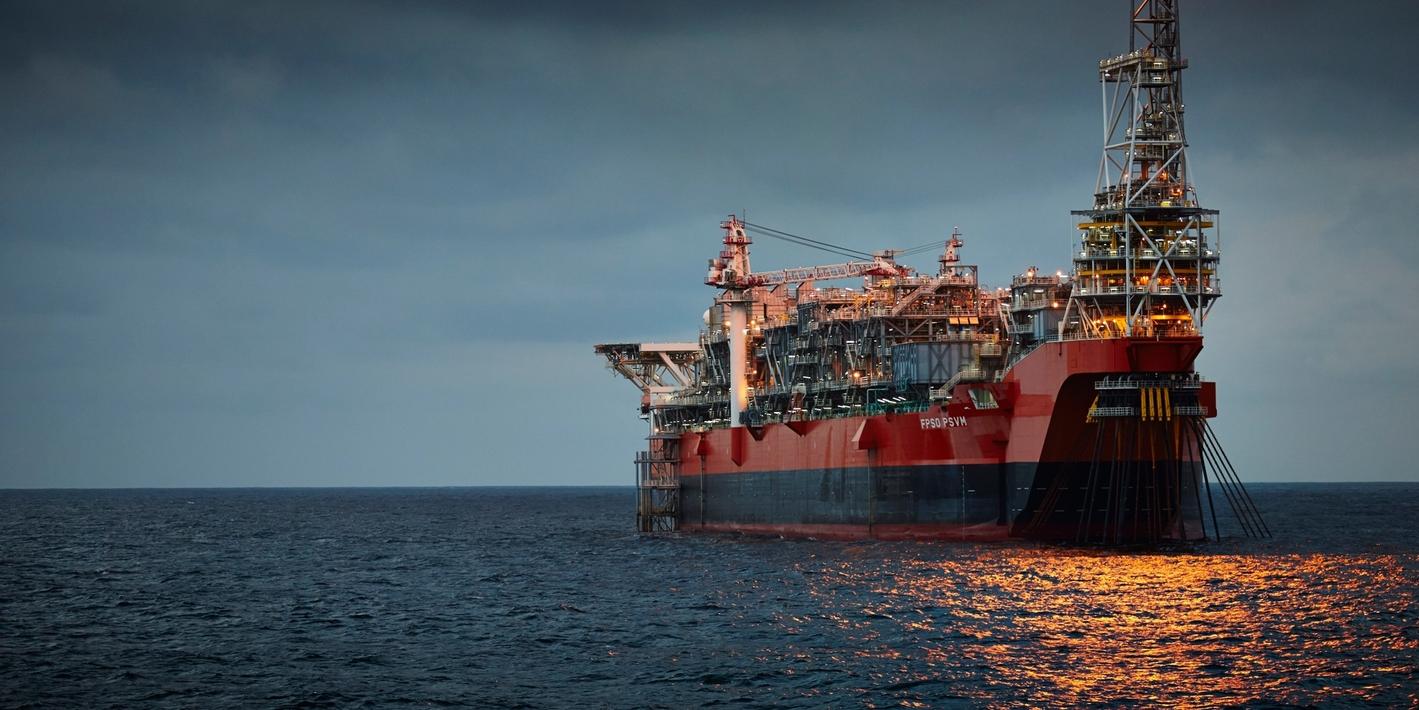The Angolan continental shelf is one of the largest contributors to our oil production outside Norway, since 1991, when we first entered the Angolan market. We are currently producing from three blocks.
Angola

The FPSO PSVM at block 31 offshore Angola
Photo: Richard Davies/BP
Essential today, essential tomorrow.
Angola has been a key country for Equinor for more than three decades. With significant proven reserves and untapped potential, Angola remains an important part of our international portfolio. By maximizing value from existing assets and pursuing new exploration opportunities, we have a long-term commitment to Angola.
How to find us in Angola
Luanda
Belas business park
Edifício Luanda 3º andar - Talatona
Luanda

Equinor in Angola
Equinor is a partner in three offshore producing blocks in the Congo Basin, on the Angolan continental shelf, with an equity production of around 110,000 barrels of oil equivalent per day (2024). Beyond our producing assets, we are partners in five exploration licenses and have signed a Memorandum of Understanding with Shell, Sonangol (NOC) and ANPG (Concessionaire) to evaluate new offshore opportunities in Angola.
Block 17
One of Angola’s first deep‑offshore licenses and historically among its most prolific, the so-called "Golden block" 17 is located about 135 km off the north‑eastern coast in deep water. It accounts for around 70% of Equinor’s oil production in Angola and is developed through four floating production storage and offloading vessels (FPSOs). Equinor holds a 22.16% equity interest, with average daily equity production of about 77,000 barrels of oil equivalent (2024). The license was extended to 2045.
Block 15
Located about 145 km off Angola’s northern coast, Block 15 is operated by ExxonMobil. Equinor holds a 12% equity interest, with average daily equity production of around 24,000 barrels of oil equivalent (2024). Production began in 2003 in the Xicomba field and now comes from four FPSOs - Kizomba A (first production in 2004), Kizomba B (2005) and Kizomba C (2008). The license was extended to 2037.
Block 31
PSVM consists of four oil fields - Plutão, Saturno, Vénus and Marte – all discovered between 2002 and 2004 in water depths of up to 2,000 meters, in the Northeast part of Block 31. Equinor holds a 13.33% equity interest, with average daily equity production of about 8,000 barrels of oil equivalent (2024). Production started in 2012 and reached plateau in 2014. The block contains 19 discoveries, of which four have been developed so far.
Block 31/21
Block 31/21 is a Production Sharing Contract in the Lower Congo Basin. Equinor and Azule Energy each hold a 50% participating interest, with Azule as operator. The block lies within the open area of Block 31.
Block 1/14
Block 1/14 is licensed under a Risk Service Contract in the Lower Congo Basin. Azule Energy operates the block with 35%. Equinor holds a 30% equity interest. A gas discovery was made at the Gajajeira‑01 well in July 2025, and drilling continues to assess its full potential.
Block 29
Block 29 is a Production Sharing Contract in the Namibe Basin. TotalEnergies operates the block with 42.8%. Equinor holds a 22.8% equity interest.
Blocks 46 and 47
Blocks 46 and 47 are Risk Service Agreements in the Lower Congo Basin. Equinor and Azule Energy each hold a 40% participating interest, with Azule as operator.
A partnership for mutual development
When Norway struck oil in the 1970s its oil and gas industry had catching up to do. International companies were invited to set up joint ventures and agreements to help the industry develop and now look where we are today. The same approach can apply to Angola where the combination of collaboration with local partners and investment in the local area can develop the Angolan industry. To further support this, the Angolan government has implemented improved fiscal terms to boost oil production from mature fields, a strategy similar to what has been done in Norway.
Development of the state-owned company, Sonangol, now focused on its core, as well as creation of the National Agency of Petroleum and Gas (ANPG) as the new regulator for the country’s oil industry, are key in this strategy. Equinor will continue to work closely with local authorities to share knowledge and competencies from NCS.
Equinor believes in being a proactive force for growth in the communities where we operate. We are responsible neighbors and want to go beyond business transactions and put purpose into what we do.
Over the past five years, together with our partners, we have reduced CO₂ emissions by around 50% through strict flaring and methane controls and targeted production curtailments, with closed flare systems now being installed in Block 17.
We also contribute to Angola’s social development through our partner‑operated licenses, the taxes we pay, and our own voluntary investments. License initiatives are delivered with our partners and aligned with Angola’s national priorities, in many areas such as education, health, demining and economic development.
Our voluntary social projects portfolio includes a new partnership with Norwegian Church Aid and IECA to bring solar energy, clean water and climate‑smart agriculture to rural communities in southern Angola, as well as the “Mangroves for Tomorrow” project with Otchiva to map and protect the country’s coastal mangrove ecosystems.
Equinor has a long history of building technical capacity in Angola, working closely with authorities and partners to share experience from the Norwegian Continental Shelf, helping create value for our assets and the wider energy sector.